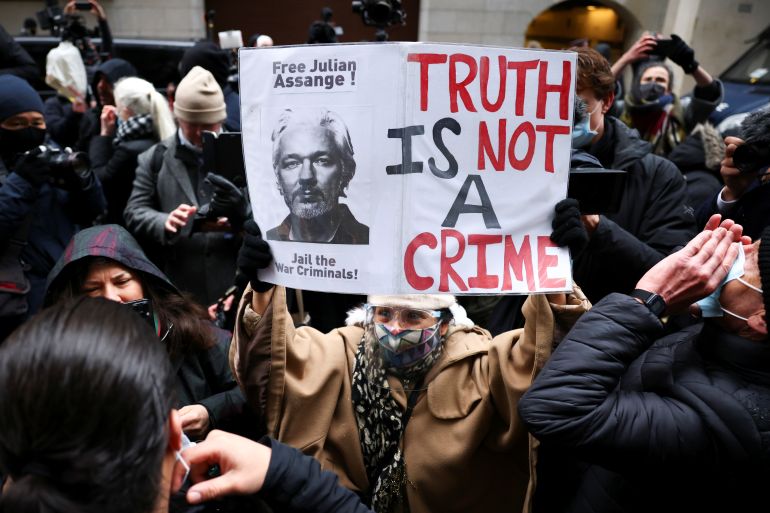What’s next after Assange extradition request blocked
Legal fight over WikiLeaks founder’s future set to intensify as US prosecutors ready to appeal extradition ruling.

The battle over Julian Assange’s future kicked into overdrive after a British judge ruled the WikiLeaks founder should not be extradited to the United States to face espionage charges.
Monday’s ruling in London saw District Judge Vanessa Baraitser reject the US request for extradition, citing concerns over Assange’s mental health and risk of suicide.
Keep reading
list of 4 itemsKilling Julian Assange
UK judge blocks US request to extradite Assange
Swedish friend of Assange fights to clear his name in Ecuador
But Baraitser’s decision is unlikely to be the final word in the case. The legal fight is expected to intensify as US prosecutors indicated they will appeal and now have a two-week window to do so.
Assange’s lawyer said he would apply for bail on Wednesday, pending that appeal.
Australia-born Assange, whose trial began in last February and concluded in October, is currently being held at the maximum-security prison in London.
US prosecutors’ anticipated appeal is expected to keep his case in the courts for months.
Possible challenges could see the UK Supreme Court and even the European Court of Human Rights forced to make judgements.
If Monday’s ruling is overturned, Assange’s case will eventually be weighed by the UK’s home secretary, who makes the final decision on extraditions.
US officials accuse Assange of 18 offences – 17 espionage charges and one charge of computer misuse – relating to the release by WikiLeaks of vast troves of confidential US military records and diplomatic cables 10 years ago.
The charges carry a maximum prison sentence of 175 years.
During his trial, prosecutors argued the publication of the material, which exposed US wrongdoing in the wars in Afghanistan and Iraq, put lives in danger.
But the 49-year-old’s lawyers countered that the case against him was politically motivated, powered by the Trump administration, and represented an assault on journalism and freedom of speech.
Baraitser rejected nearly all of Assange’s legal team’s arguments but said she could not approve his extradition as there was a real risk he would commit suicide in a US maximum-security prison.
Assange, she said, suffered from at times severe depression and had been diagnosed with Asperger’s and autism, albeit he was “a high functioning autistic case”.
Half a razor blade was found in his London prison cell in May 2019 and he had told medical staff about his suicidal thoughts.
“I find that Assange’s risk of committing suicide if an extradition order were to be made, to be substantial,” Baraitser said in her ruling.
“Faced with conditions of near-total isolation … I am satisfied that the procedures [outlined by US authorities] will not prevent Assange from finding a way to commit suicide.”
Baraitser’s ruling not to approve Assange’s extradition was welcomed by the latter’s supporters, as well as an array of rights groups and politicians.
But some expressed concern about the justification underpinning the decision.
“We disagree with the judge’s assessment that this case is not politically motivated that it is not about free speech,” Rebecca Vincent, the director of international campaigns for Reporters Without Borders, said.
“We continue to believe that Assange was targeted for his contributions to journalism, and until the underlying issues here are addressed, other journalists, sources and publishers remain at risk.”